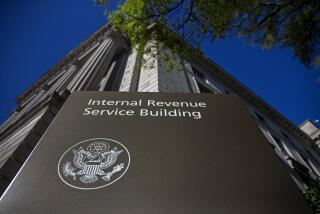Also Working on Simpler W-4 Form : IRS Suggests a Way Out of Withholding Confusion
- Share via
WASHINGTON — Internal Revenue Service Commissioner Lawrence Gibbs, under attack in Congress for the complex new W-4 tax withholding forms, Friday suggested a simpler solution for taxpayers to ensure that they will not face any interest or penalty charges for underwithholding.
Without going through the new longer work sheet, taxpayers can add a stated dollar amount on the short basic form to their existing withholding allowances to bring their withholding up to the level of the taxes they owed for 1986.
Even if a taxpayer later winds up owing more taxes for 1987 than were withheld, he said, the IRS will not assess interest or penalties on the amount due if the withholding at least matches 1986’s tax payment.
Gibbs cited this no-penalty guarantee, long a part of the tax code, in testimony before House and Senate subcommittees that demanded to know what the IRS was doing about the widespread public objections to the new forms.
After acknowledging that millions of taxpayers are confused by the unwieldy new withholding instructions, Gibbs assured the lawmakers that the IRS is trying to produce a simplified form of the work sheet that is used to determine the proper number of withholding allowances.
“We are moving heaven and earth to address the problems,” he told the lawmakers. “I hope in the next several weeks we will be able to come out with something,” he added.
However, Gibbs’ testimony did little to quench the political firestorm on Capitol Hill ignited by constituents upset over their first experience with the new tax law.
“The new W-4 form is a disaster. It is an absolute fiasco,” Sen. David Pryor (D-Ark.), chairman of the Senate Finance subcommittee, told Gibbs during a morning hearing. The new form “has started a prairie fire across America that is leading to a taxpayers’ revolt.”
Cites Biblical Tax Man
Pryor cited the biblical story of Zacchaeus, the hated tax collector who later repented and became a disciple of Jesus.
“Mr. Commissioner, today we want you to repent,” Pryor said. “We want to offer you the opportunity for salvation.”
Gibbs didn’t offer to repent. Moreover, he acknowledged that the promised new instructions may apply only to middle- and lower-income taxpayers with relatively simple tax situations and may not be as accurate as the complex, four-page sheets.
He noted also that taxpayers who give up and simply withhold the same dollar amount as their 1986 taxes may easily wind up overwithholding and then have to wait to get their money back in a refund.
Honest Mistakes
The head of the IRS did pledge that taxpayers who make honest mistakes on the document are not going to be hit by the threatening $500 penalties. Those sanctions are aimed primarily at tax protesters and others who deliberately file a misleading withholding statement, he said. “If you have tried to comply with your withholding obligations, made a sincere effort,” he said, “we will find a way to waive those penalties.”
Thousands of taxpayers have been so frightened by the threat of penalties, which are actually unchanged from the old law, that they have been paying large sums to tax preparers for help in filling out the form.
Every taxpayer subject to withholding--more than 100 million people--is required to file a new W-4 form by Oct. 1 to prevent his employer from automatically withholding later this year at a rate that assumes he has no exemptions.
Since the new tax law went into effect on Jan. 1, most taxpayers have received an increase in take-home pay because the value of each withholding allowance has nearly doubled. The longer taxpayers delay in filing a new W-4 form, the greater the chance that too little will be withheld from their paychecks.
Simplification Rejected
At the heart of the controversy was the IRS’s decision last year, when faced with an impending deadline, to ignore internal suggestions to design a simplified form or adopt a different, more understandable approach to withholding. Instead, top officials were committed to trying to make withholding more accurate.
In responding to the complaints, Gibbs said the IRS now recognizes that the new form risks “having the public’s perception of tax reform negatively affected,” and he said that, “if the current W-4 form is not working as intended for many American taxpayers, then the service should respond in some fashion with a simplified form.”
Last month, Treasury Secretary James A. Baker III surprised IRS officials when he told a congressional committee that he wanted the agency to take another look at the document.
Nearly 300 million copies were printed without any serious effort to test the form on ordinary taxpayers, Gibbs acknowledged Friday. The new instructions will be tried out on average taxpayers before the IRS issues them.
More to Read
Get the L.A. Times Politics newsletter
Deeply reported insights into legislation, politics and policy from Sacramento, Washington and beyond. In your inbox twice per week.
You may occasionally receive promotional content from the Los Angeles Times.








